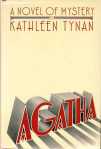
 Kerrie’s Alphabet of Crime community meme over at the Mysteries in Paradise blog has returned for 2012. Each week those participating will post a review, author biog or a thematic item in which either the first letter of the title or the name or surname of the author match that week’s. To sign up just click here. Last year I got in on the act a little bit late but I’ve learned my lesson and today I begin at the beginning, with a thematic post …
Kerrie’s Alphabet of Crime community meme over at the Mysteries in Paradise blog has returned for 2012. Each week those participating will post a review, author biog or a thematic item in which either the first letter of the title or the name or surname of the author match that week’s. To sign up just click here. Last year I got in on the act a little bit late but I’ve learned my lesson and today I begin at the beginning, with a thematic post …
A is for … Agatha Christie (who of course knew a thing or two about ABC)
and her small case of Amnesia.
When putting together this post, I was reminded of the fact that the first Agatha Christie novel I ever owned (I would have been about 10 years old) what not by her but about her. Kathleen Tynan’s Agatha creates a fictional tale about a real mystery in the author‘s life. I remember picking it up as I was intrigued by that frequently used phrase, ‘Soon to be a major film’. Actually, it’s not a greta book as I recall and the movie doesn’t really work either, despite the excellent Vanessa Redgrave in the title role (I mean, would you cast Dustin Hoffman as her romantic interest? Well, maybe if you he were a co-producer, which he was …).
On 2 December 1926 the young Agatha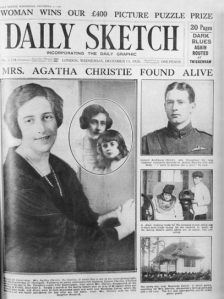 Christie kissed her daughter goodbye and walked out on her family and would not be seen again by them for 11 days. Her car was later found but her disappearance made the national newspapers. Was it a publicity stunt? She was eventually found at a Hydro Spa in Harrogate where she had registered under the assumed name ‘Teresa Neele’, which provides a clue perhaps. The author had been going through a severe emotional crisis at the time. Her mother had recently dies and her marriage was falling apart. Indeed her husband, Archibald Christie, was suing for divorce so he could marry another woman – one with the same surname as the one she picked when she went on the run (so to speak).
Christie kissed her daughter goodbye and walked out on her family and would not be seen again by them for 11 days. Her car was later found but her disappearance made the national newspapers. Was it a publicity stunt? She was eventually found at a Hydro Spa in Harrogate where she had registered under the assumed name ‘Teresa Neele’, which provides a clue perhaps. The author had been going through a severe emotional crisis at the time. Her mother had recently dies and her marriage was falling apart. Indeed her husband, Archibald Christie, was suing for divorce so he could marry another woman – one with the same surname as the one she picked when she went on the run (so to speak).
It is now thought by many that Christie was acting in a ‘fugue state’, a rare kind of amnesia in which the sufferer travels and can create a new persona, escaping from their actual problems and creating a new identity as refuge as part of a strategy of escape. She would later claim not to be able to remember anything from her blackout period, which was certainly some kind of breakdown. In Tynan’s version Christie was in fact planning an elaborate crime – if you are interested, the film version (which certainly looks a peachy thanks to the shimmering cinematography of Vittorio Storaro) is easier to track down that the original book. Despite its wonderful look, it’s fairly awkward movie with Redgrave and Hoffman making for a very poor pair and director Michael Apted seems determined to emphasise the disparity in their acting styles and physical appearance so as to make their romantic scenes together fairly ludicrous.
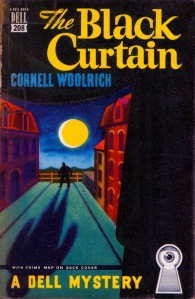 Christie’s own stories rarely feature amnesia in their plots (The Secret Adversary and Ordeal by Innocence are the only obvious candidates that spring to mind) but plenty of other authors been drawn to the dramatic possibilities. To my way of thinking, as dramatic and disconcerting as it may be in real life, in fictional terms memory loss can be nigh on irresistible as a storytelling gambit There are so many permutations within fiction of this condition, either when presented as real or feigned, and it is certainly a well-used scenarios in mystery stories – and for me, when done well, truly one of the most seductive. Such differing genre writers as LP Davies and Cornell Woolrich returned to the notion time and again, producing several ingenious variations on it.
Christie’s own stories rarely feature amnesia in their plots (The Secret Adversary and Ordeal by Innocence are the only obvious candidates that spring to mind) but plenty of other authors been drawn to the dramatic possibilities. To my way of thinking, as dramatic and disconcerting as it may be in real life, in fictional terms memory loss can be nigh on irresistible as a storytelling gambit There are so many permutations within fiction of this condition, either when presented as real or feigned, and it is certainly a well-used scenarios in mystery stories – and for me, when done well, truly one of the most seductive. Such differing genre writers as LP Davies and Cornell Woolrich returned to the notion time and again, producing several ingenious variations on it.
Woolrich frequently went for the temporary blackout so that in such fine examples of Noir as The Black Curtain (1941) and The Black Angel (1943) the characters usually wake up after a bender unable to remember what they did for several crucial hours. A variant on this, with the protagonist waking up unable to recall how they came into the possession of a gun, a bag full of money, a smoking gun or all three can be found in such different novels as Eva Figes’ Nelly’s Version (1977) and Jonathan Latimer’s Sinners and Shrouds (1955).
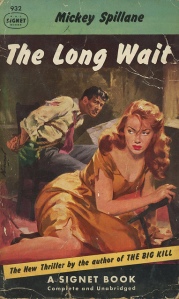 One of Woolrich’s best memory loss plots can be found in ‘And So to Death’, a 1941 story originally published under his William Irish byline, which has been republished under various titles including ‘Nightmare’. This story involves hypnotism and lead the away from tales of accidental bumps on the head leading to temporary amnesia to darker narratives featuring brainwashing as a deliberate conditioning technique. One of the first classic examples of this can be found in the satirical conspiracy thriller The Manchurian Candidate (1959) by Richard Condon in which it’s Communist China who is using the technique to destabilise the US government. LP Davies seemed to spend most of his career writing variation on the theme of the protagonist suddenly awakening and either being completely unaware of who they are or becoming convinced that the they are not the person they previously thought they were. I previously reviewed what may be Davies’ best such novel, Man out of Nowhere (aka ‘Who is Lewis Pinder?’) for last year’s Alphabet of Crime (see here). As Davies’ stories were mostly written in the 60s and early 70s and often veered into SF territory they frequently plumped for the brainwashing solution to his protagonists’ existential problem, though one can see that it was the battle-scarred veterans of the Second World War that also led to an increase in this kind of story, both int he cinema and at the movies.
One of Woolrich’s best memory loss plots can be found in ‘And So to Death’, a 1941 story originally published under his William Irish byline, which has been republished under various titles including ‘Nightmare’. This story involves hypnotism and lead the away from tales of accidental bumps on the head leading to temporary amnesia to darker narratives featuring brainwashing as a deliberate conditioning technique. One of the first classic examples of this can be found in the satirical conspiracy thriller The Manchurian Candidate (1959) by Richard Condon in which it’s Communist China who is using the technique to destabilise the US government. LP Davies seemed to spend most of his career writing variation on the theme of the protagonist suddenly awakening and either being completely unaware of who they are or becoming convinced that the they are not the person they previously thought they were. I previously reviewed what may be Davies’ best such novel, Man out of Nowhere (aka ‘Who is Lewis Pinder?’) for last year’s Alphabet of Crime (see here). As Davies’ stories were mostly written in the 60s and early 70s and often veered into SF territory they frequently plumped for the brainwashing solution to his protagonists’ existential problem, though one can see that it was the battle-scarred veterans of the Second World War that also led to an increase in this kind of story, both int he cinema and at the movies.
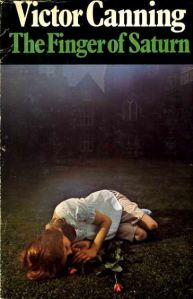 The men and women coming home after the war certainly found that many things had changed and this device helped dramatise this sense of malaise and discontinuity in an exciting and different way, and threw in some of that new fangled Freudian psychiatry too. Robert Bloch, Margaret Millar and Helen Eustis all came up with classic novels in which characters works through a form of dissociative disorder for some very surprising results. Richard Matheson gave it a whirl his first novel, Someone is Bleeding (1953), for instance while Evan Hunter used it for a more mainstream tome, Buddwing (1964), as did Victor Canning in The Finger of Saturn (1973). Even Mickey Spillaine used the plot in The Long Wait (1951), a book that doesn’t feature Mike Hammer however but which, like I, the Jury (1947), is a story of a man out to avenge the murder of his buddy.
The men and women coming home after the war certainly found that many things had changed and this device helped dramatise this sense of malaise and discontinuity in an exciting and different way, and threw in some of that new fangled Freudian psychiatry too. Robert Bloch, Margaret Millar and Helen Eustis all came up with classic novels in which characters works through a form of dissociative disorder for some very surprising results. Richard Matheson gave it a whirl his first novel, Someone is Bleeding (1953), for instance while Evan Hunter used it for a more mainstream tome, Buddwing (1964), as did Victor Canning in The Finger of Saturn (1973). Even Mickey Spillaine used the plot in The Long Wait (1951), a book that doesn’t feature Mike Hammer however but which, like I, the Jury (1947), is a story of a man out to avenge the murder of his buddy.
Howard Fast came up with a cracking example in Fallen 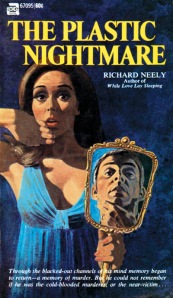 Angel (later republished as ‘Mirage’), which I previously reviewed here. More recent examples include Richard Neely’s The Plastic Nightmare (1969), which added cosmetic surgery to make matters even more confusing, as the title suggests (it is now more easily available under the title ‘Shattered’). Brainwashing became something of a stable from Richard Condon’s magisterial story onwards, especially in spy fiction after the success of Len Deighton’s The IPCRESS file (1962). Even James Bond suffered, attempting to kill M in the opening to The Man with the Golden Gun (1964). An agent with amnesia became the premise for the Jason Bourne series by Robert Ludlum (and subsequently others).
Angel (later republished as ‘Mirage’), which I previously reviewed here. More recent examples include Richard Neely’s The Plastic Nightmare (1969), which added cosmetic surgery to make matters even more confusing, as the title suggests (it is now more easily available under the title ‘Shattered’). Brainwashing became something of a stable from Richard Condon’s magisterial story onwards, especially in spy fiction after the success of Len Deighton’s The IPCRESS file (1962). Even James Bond suffered, attempting to kill M in the opening to The Man with the Golden Gun (1964). An agent with amnesia became the premise for the Jason Bourne series by Robert Ludlum (and subsequently others).
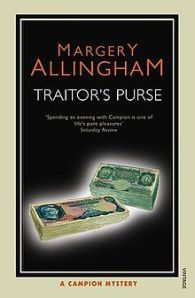 The trauma of memory loss has thus also only occasionally befallen some of crime fiction’s most beloved series characters. While Bond briefly flirted with it and then got over it (at the cinema he has had to deal with a different kind of identity crisis every few years or so as his face keeps changing), while Bourne would be defined by it. On the other hand, the supremely rational and apparently easy-going Albert Campion in Traitor’s Purse (1941) by Margery Allingham is suddenly unable to remember who he is just as Britain goes to war against the Nazis. In Puzzle for Fiends (1946) by Patrick Quentin, his (well, their) urbane and usually level-headed (if occasionally drunk) hero Peter Duluth, now with the war recently over, also finds his memory at a loss and caught up in a criminal enterprise. Even the supremely rational Ellery Queen had to deal with similar cases of mental instability, though not with himself affected, in Ten Day’s Wonder (1948) and later The Player on the Other Side (1963), stories in which damaged people are used as pawn by unscrupulous murders with godlike delusions.
The trauma of memory loss has thus also only occasionally befallen some of crime fiction’s most beloved series characters. While Bond briefly flirted with it and then got over it (at the cinema he has had to deal with a different kind of identity crisis every few years or so as his face keeps changing), while Bourne would be defined by it. On the other hand, the supremely rational and apparently easy-going Albert Campion in Traitor’s Purse (1941) by Margery Allingham is suddenly unable to remember who he is just as Britain goes to war against the Nazis. In Puzzle for Fiends (1946) by Patrick Quentin, his (well, their) urbane and usually level-headed (if occasionally drunk) hero Peter Duluth, now with the war recently over, also finds his memory at a loss and caught up in a criminal enterprise. Even the supremely rational Ellery Queen had to deal with similar cases of mental instability, though not with himself affected, in Ten Day’s Wonder (1948) and later The Player on the Other Side (1963), stories in which damaged people are used as pawn by unscrupulous murders with godlike delusions.
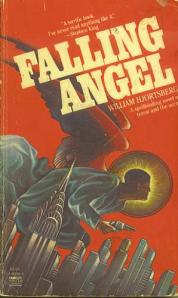 But in the era of Orwell’s 1984 (1948), Burgess’ A Clockwork Orange (1962), RD Laing’s The Divided Self (1960) and Ken Kesey’s One Flew Over the Cuckoo’s Nest (1962), it was increasingly hard for the protagonists of fiction to know if they were even the heroes of their own narrative. Thus some of my favourite examples in the amnesia sub-genre include such works as William Hjortsberg’s Falling Angel (1978; later filmed as Angel Heart), a Woolrich homage that takes us into hitherto unexplored areas of existential annihilation; and perhaps my absolute favourite of those books with a more modern flavour, The Running of Beasts (1976) by Bill Pronzini and Barrry Malzberg, in which the hunt for a serial killer is delayed somewhat by the fact that one of the detectives may well be the killer without knowing it. The surprise at the end is well worth waiting for.
But in the era of Orwell’s 1984 (1948), Burgess’ A Clockwork Orange (1962), RD Laing’s The Divided Self (1960) and Ken Kesey’s One Flew Over the Cuckoo’s Nest (1962), it was increasingly hard for the protagonists of fiction to know if they were even the heroes of their own narrative. Thus some of my favourite examples in the amnesia sub-genre include such works as William Hjortsberg’s Falling Angel (1978; later filmed as Angel Heart), a Woolrich homage that takes us into hitherto unexplored areas of existential annihilation; and perhaps my absolute favourite of those books with a more modern flavour, The Running of Beasts (1976) by Bill Pronzini and Barrry Malzberg, in which the hunt for a serial killer is delayed somewhat by the fact that one of the detectives may well be the killer without knowing it. The surprise at the end is well worth waiting for.
This has been a slightly higgledy piggledy trawl though mystery fiction featuring amnesia as a theme and is partly intended as a preview of coming attractions as I hope to review at least some of these as part of the weekly posts for the Alphabet of crime. Watch this space.


Sergio – I’m impressed at the way you pull together these different novels with the same thread of amnesia. Such an interesting theme actually because in my opinion it’s one of those “razor’s edge” themes. When it’s done well it can be brilliant. When it’s not…… I’m looking forward to your further posts on some of these books, too.
Thanks very much Margot – yes, I definitely cherry picked some favourites here and decided to omit a lot of shall we say rather ‘less impressive’ uses of this particular plot device!
I have heard of this situation with Agatha Christie and there has been movies about it. Her life and her mental state has always fascinated me.
Thanks Clarissa, it just amused me that one of the most famous things about this very private person was somethign that seemed tso akin to her creative work – but which then gets relentlessly fictionalised. Of course if you really want to know what happened, then Doctor Who is the place where we are given what is probably the true answer as to why she went missing.
Very interesting post Sergio. I have also added it to the Agatha Christie Blog Carnival: http://acrccarnival.blogspot.com/2012/05/acrc-carnival-2012-5-may.html
Thnaks very much for the kind words Kerrie, and for adding the post to the blog Carnival, that’s really great.
Great post, Sergio. I’ve read a couple of versions of Christie’s “escape from reality” and find it fascinating. I haven’t seen the movie version (probably won’t based on your synopsis of the presentation). Amnesia is a tricky subject–as Margot says, when it’s done right it can be a great plot device. I find it interesting that you mention Latimer’s Sinners & Shrouds–I’ve got that one on the TBR list for this year…..
Thanks very much Bev – it’s been ages since I saw the film I should add, but it didn’t leave a very good impression I’m afraid. I love Latimer – really look forward to reading your review.
I loved that Dr. Who episode with Fenella Woolgar as Agatha. Did you know that the episode works into the dialogue several titles of her books? I think I counted 12 of them. A lot of fun that one while most diehard Dr. Who fans absolutely hated it.
Amnesia is a great crime fiction trope that I think is used even more often in crime and noir movies. BLACK CURTAIN is a great book – one of the best of the amnesia tales. But I think you misremember it. ;^) The main character receives a blow to the head and suddenly recalls who he is and learns that he’s been missing for over a year not just a few hours. There is also the oft used plot device of waking up in a bed with a corpse and not having a clue how it got there: HOMICIDE HONEYMOON by Donald Bayne Hobart, BODY IN MY ARMS by Ralph Stevenson and the movie THE MORNING AFTER w/ Jane Fonda among many, many others I’m sure. I will have to track down that Matheson book. I read about it a while ago. Thanks for reminding me!
I have a review of Net of Cobwebs by Elisabeth Sanxay Holding, but I promised I would wait until the Stark House reissue of that book comes out at the very end of the year. Something to look forward to…I hope.
OK John, you deserve a two part response mate. Well, first the whole Doctor Who issue – Gareth Roberts is a very funny writer and completely knows his Who so I sort of knew what to expect after his Shakespeare pastiche. And he co-wrote my favourite comedy Who audio too, The One Doctor, which I really recommend if you’re a fan of the classic show from the 80s. But I was still completely unprepared for how daft and camp a panto this one was going to be. I did slightly lose count of the Christie titles (my favourite: “Why didn’t they ask … heavens!”) and did enjoy it as a kind of parallel universe silly adventure. I did wish that, having down Shakespeare and Dickens, they could maybe have picked a slightly less obvious author to wax so lyrical about (Salman Rushie too much to ask for?). Woolgar was great casting though – have you seen the Steven Moffat version of Jekyll in which she co-stars opposite Gina Bellman and James Nesbit? If you haven’t you really must as it has the most fabulous, jaw-dropping twist in the last 20 seconds of any TV show I can think of from the last 10 years. And that’s my segue into saying that as much as I liked Tennant, I much prefer the show with Matt Smith as overseen by Moffat, whose approach chimes much more with my own and who has brought a wonderful fairy tale atmosphere to the show.
As for my forgetfulness … I did over generalise with regards to the Woolrich, sorry about that, you are absolutely right. I have not read the Hobart or Stevenson books though I have seen to Fonda movie (thought it was pretty poor as I recall). But there must be dozens of examples on TV with a a character waking up next to a blonde. Really looking forward to your review of the Holding (if she’s good enough for Raymond Chandler …) – I admire your steadfast resolve to wait for the publication date!
The Matheson book is otherwise available in his Noir anthology bundled with a nice intro and his other two pulp 50s thrillers, Fury on Sunday and Ride the Nightmare, which I reviewed for last years Alphabet challenge.
Thanks for all the great feedback as always John, much appreciated.
That’s just a terrific post Sergio. I have God only knows how many movies that play around with the amnesia theme, but nowhere near as many books. I’ve just ordered a copy of Woolrich’s The Black Curtain based on this piece though.
One amnesia-based book that I have read recently was Night Walker by Donald Hamilton. It’s part of the Hard Case Crime line and, while it’s may not be the best example of the device, I still found it a lot of fun.
Thanks very much Colin for the very kind words. Woolrich’s output up to about 1950 is just terrific so I really hope you enjoy this one. I haven’t read any Hamilton books outside from some of the Matt Helm series (radically different from the film and TV versions) but I’ve always been curious about some of his other work, especially as he wrote the novel basis for one of my favourite Cold War Westerns, The Big Country. I have no idea how close it is to the original. I’ll definitely see about getting The Night Walker, thanks very much for the suggestions.
You’re welcome, you’ve offered an excellent overview of a fascinating little genre.
My Woolrich collection is building steadily, and I haven’t been disappointed by anything I’ve read so far.
Yeah, try Hamiltons book; the ending is a bit weak I thought, but it has a nice pulpy/noir feel throughout.
Just ordered the Hamilton (amazing thing the interweb) so expect a review in these parts soon-ish!
Cool!
Let’s see if we agree …
Indeed! I’m keen to hear what you make of it when you get round to it.
Thank you for an interesting post. In my career as a lawyer I have seen lots of witnesses with selective amnesia but none with the real thing.
Hello Bill, thanks very much for the kind words. I trained as a lawyer but never took articles or the bar axams which is why I work in education instead! In those few cases where a really dramatic true-life case of amnesia comes along it becomes a real case celebre, which probably tells you how rare it is compared with fiction. But that’s a good thing, right? There is a fascinating documentary of a real case, Unknown White Male that is very intriguing.
Re Agatha Christie’s disappearance:
AC wrote a number of books under the pseudonym Mary Westmacott. (For some reason these are described as romantic novels, but they are far more complex and often personal than that.) I read these many years ago and was astonished to discover that the one entitled Unfinished Portrait comes very close to the truth of the experience that caused her to disappear, above all the emotional truth. Her autobiography more or less glosses over the episode, but I felt writing this book was her way of dealing with it.
Thansk Anne, I haven’ read any pof the Westmacott books, but that sounds like one that I would enjoy (I was put off by the romance tag, I’ll admit). Thanks very much, I’ll sabout tracking down Unfinished Portrait.
Some of them are very politically naive, but they were a way to be her real self as the Christie crime novels couldn’t always. One of them (Giant’s Bread?) allowed her to talk about a love of hers, music. It’s known that she gave up the idea of becoming a concert pianist because of shyness.
Thanks Anne – I have read around Christie’s books but not the author herself very much – truly fascinating.
Sergio, thanks very much for writing about Agatha Christie’s brief amnesiac bout. I absolutely didn’t know about it – an intriguing aspect in her otherwise chequered life. The “Daily Sketch” reproduction had me by the eyeballs not to mention your amazing recollection of amnesia as a theme in mysteries. Great post, Sergio!
Glad you enjoyed the post Prashant, thanks very much indeed. ‘Recollection’ very much the operative word here I think, in many different senses …
To bad the story about her wasn’t better, you piqued my interest. I think Amnesia has became popular again, many books have it as a plot, the most recent ‘hyped’ one Before I go to Sleep. I chose Andrea Kane for A.
Thanks very much for the comment Mace. I just picked up Laura Lippman’s I’d Know You Anywhere, which is supposed to be a very good amnesia story too – we shall see …
Pingback: UNFINISHED PORTRAIT (1934) by Agatha Christie | Tipping My Fedora
Sergio, something silly to relate. I picked up a book randomly and started reading the first few pages. It turned out that the narrator was suffering from a memory loss. Reading it, I recalled this post and then just a few lines down, this sentence:
…Enjoy life, Sergio!”
The protagonist’s name was Sergio!!! I just burst out laughing.
Ha! You must tell me the title Neeru, please 😀 If you can remember it, of course ….
“If you can remember it….” That’s a sixer, Sergio:)
The book is La Camera Viola by Mauro Casiraghi, translated into English as The Purple Room. it has won a couple of awards too. I have liked what I have read so far.
Excellen! – well, fair enough really, pretty common name back home. I’ll definitely pick up a copy when I go back. Grazie